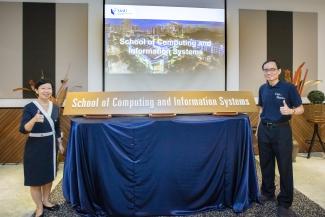
Blockchain technology has many application possibilities across a myriad of sectors, including agribusiness. SMU’s Professor of Strategic Management Tan Wee Liang spoke on the topic at the 68th United Nations (UN) Civil Society Conference held in Salt Lake City, Utah, which focused on sustainable solutions for challenges of urban life.
The Conference, described by the UN as the Organisation’s ‘premier event in the civil society calendar’, was held from 26 to 28 August 2019. It brought together representatives of civil society from around the world, and senior UN officials, to discuss a wide range of solutions to the challenges of urban life and the modern world. This year, nearly 8,000 participants from 138 countries met to discuss more than 100 topics on the agenda.
Specifically, Prof Tan, who is also secretary-general of the International Association for Agricultural Sustainability (IAAS), highlighted the value of blockchain technology to ensure traceability and food security.
Blockchain records are extremely difficult, if not impossible, to falsify – therein lies its potential. As blockchains allow for record keeping of every single dealing with the items at every touchpoint, food fraud could be prevented as authorised parties of the supply chain are able to trace the origins of the food item with precision.
Prof Tan illustrated this through an example of tainted medicines and counterfeit drugs. 15 years ago, prior to the development of doctrine technology, one of his doctoral students had employed a centralised system to track pharmaceutical products manufactured by her company. A unique number was assigned to every single product; and in the same manner, a unique number to every carton that contained a number of the products. Additionally, identification numbers were assigned to every point of contact along the supply chain. This way, the system could trace and track the exact movement and delivery times along the supply chain. The manufacturer could therefore advise its retailer that if, for example, goods arrived outside of the scheduled delivery time, they should be rejected because they are likely to be counterfeit.
Today, traceability and tracking can be enabled with the blockchain technology, with enhanced efficiency, privacy and accountability within the supply chain of agribusiness. In fact, blockchain technology is already being used by various key players in the agricultural industry, including large food companies such as Cargill’s and department stores such as Walmart (which requires their farm produce suppliers to adopt their system which employs IBM’s software). Start-up companies have also emerged, seeking to disrupt the industry through their own blockchain supply systems.
The 2019 conference was chaired by Maruxa Cardama, Secretary General of the Partnership for Sustainable, Low Carbon Transport, who described cities and communities as ‘living laboratories’ where ‘the challenges and opportunities that are central to the 2030 Agenda for Sustainable Development and the Paris Agreement on Climate Change become tangible”. She said that cities and communities can provide opportunities to translate major global issues – from climate change, to human rights, education and jobs for youth – into positive local action for improving livelihoods and protecting the planet.
[Featured photo: (L-R) SMU’s Prof Tan Wee Liang; Cheryl Hanewicz, Vice President of Utah Valley University; Pamela R. Becker, Professor of East Michigan University; Jackie Biskupski, Mayor of Salt Lake City, USA; and Tzong-Ru Lee, Vice Chairman of IAAS; Mr Kuo-Chang Fu, Founder of IAAS (currently pursuing the PhD in Business (General Management) programme at SMU).]